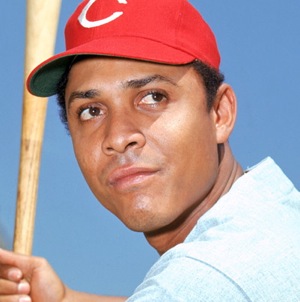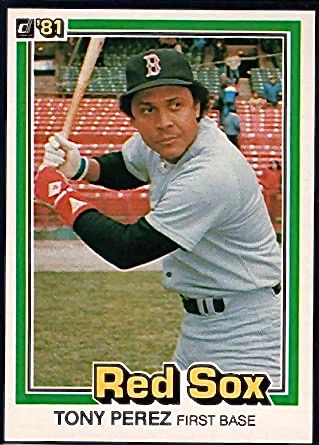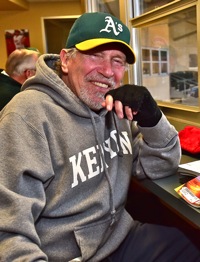It’s been 35 years since hall of famer Tony Perez set foot on the field as a player for the Cincinnati Reds for the last time…2,732 hits, 379 home runs, 1,652 career rbis. His final line score: He deserved a better exit than how it all came down.
Over the years—still today—people ask me what player I liked best of all those I met as a Reds beat writer and later as a television reporter in Cincinnati. It’s a hard question to answer because there are so many I liked, that I considered a friend and for so many reasons. There was no one funnier than Dave Parker, no one nicer than Davey Concepcion, few as smart and foresighted as John Bench, and no one more kind than Tom Hume.
That said, there was no one I respected and admired more—as a man, as a good human being—than Tony Perez. In a short period of time, I learned why trading Tony sank The Big Red Machine. Tony is one of those people who simply makes all those around him better, and in all respects. No one who knows him would argue that point, and yet, the Reds organization stepped on him and hurt him time and again.
The measure of the man, of course, was that when he was inducted into the Hall of Fame in 2000, there was no question that he would enter as a member of the Reds.
Hopefully, the story that follows begins to explain my admiration for Atanasio. He is simply better than most. – Greg Hoard (June, 2020)
 CINCINNATI—Through most of the 1986 season, the Reds were a contender in the National League West, looming two or three games out of first place. The problem, of course, was pitching. The Reds didn’t have enough, and though several teams approached them about trades, offering the likes of Rick Reuschel, Dave Dravecky and Don Robinson, the front office balked.
CINCINNATI—Through most of the 1986 season, the Reds were a contender in the National League West, looming two or three games out of first place. The problem, of course, was pitching. The Reds didn’t have enough, and though several teams approached them about trades, offering the likes of Rick Reuschel, Dave Dravecky and Don Robinson, the front office balked.
The front office back then consisted of owner Marge Schott, general manager Bill Bergesch and field manager Pete Rose, who, in fact, called all the shots because he had Mrs. Schott’s ear. Though she ran GM dealerships, Pete could have sold her a Rambler.
But when the trades fell through or weren’t made, it wasn’t Schott or Rose who spoke to the issue. It was Bergesch, the former Yankee GM, known as “Dollar Bill”, and “Dollar Bill” always said the same thing: every trade, he insisted, hinged upon the Reds giving up one of their prized young players: Kurt Stillwell, Kal Daniels, Tracy Jones, Paul O’Neill, Eric Davis or Barry Larkin. “We’re not going to mortgage our future,” Bergesch said, even though most of these players, who Bergesch referred to as the “Crown Jewels”, spent time on the bench. The lone exception was Davis, clearly an untouchable. Everyone else was fighting for position, even Larkin.

McSobers enthusiastically supports youth baseball on Press Pros Magazine.com
Consequently, the Reds hold in the pennant race was never really secure. There were grumbles in the clubhouse about the organization’s unwillingness to pull the trigger on a trade. “A lot of us who felt like we had given a lot to the team began to resent the fact that management wouldn’t make that move to get us over the top,” said Dave Parker, clearly the leader of the team.
Eventually and for a number of reasons – primarily pitching – the season came crashing down, and in the middle of all this, a legend was shown the door, ushered to an unceremonious and undeserved exit. It wasn’t right, it wasn’t fair, and Pete Rose, the man so revered in Reds’ Country, was instrumental in this injustice. In fact, he was the principle player.
DURING THE WINTER of 1984, Reds General Manager Bob Howsam made two important acquisitions. He re-signed Tony Perez, who he had traded to Montreal after the 1976 Reds’ world championship, a trade he later called “the worst move I made in my entire career.”
That trade stripped the heart from the Reds. “It was a horrible mistake,” said Joe Morgan, never one to guard a word. “No one in management realized what Tony meant to the team. It wasn’t only what he did on the field, it was what he did in the clubhouse. Tony was our glue. He was the person that kept us all together. Who knows? Had Tony not been traded we might have won another world championship, maybe two, maybe more, who knows? It’s hard to say. He was that valuable and that important to our team.”
By the winter of 1984, Howsam was occupied with damage control. Perez was 42. He had spent three seasons in Montreal, three more with Boston and had played a role in Philadelphia’s pennant in 1983. Howsam was trying to revive a team that was on the rocks.
He didn’t bring Perez back for production. He brought him back for morale and some connection with the Reds’s past. The man he brought in for production was free agent Dave Parker, the former Pirate, two-time batting champion and National League MVP. Together, and in different ways, Parker and Perez elevated the Reds. Given what surrounded them, they couldn’t lift them much, but their spirit gave the Reds a puncher’s chance in most games.
 BY THE 1986 SEASON, Pete Rose was back as player-manager. Howsam was gone, fearing the direction Schott’s ownership might take. Rose, meanwhile, had reached his historic hit. He was the unquestioned boss, and he had talked Mrs. Schott into adding players to give the Reds a reasonable chance at a run. They weren’t Ramblers, but they weren’t Cadillacs: pitchers John Denny and Bill Gullickson; and catcher Bo Diaz. The strongest addition was Gold Glove third baseman Buddy Bell.
BY THE 1986 SEASON, Pete Rose was back as player-manager. Howsam was gone, fearing the direction Schott’s ownership might take. Rose, meanwhile, had reached his historic hit. He was the unquestioned boss, and he had talked Mrs. Schott into adding players to give the Reds a reasonable chance at a run. They weren’t Ramblers, but they weren’t Cadillacs: pitchers John Denny and Bill Gullickson; and catcher Bo Diaz. The strongest addition was Gold Glove third baseman Buddy Bell.
So, here they were in 1986, two games out of first place in late July, early August, with a nine-game road trip coming up: three in San Diego, three in Los Angeles and three with the Giants. “This,” Rose said, “is where we can make up some ground.”
As it turned out, this is where it got away from the Reds and this is where Tony Perez was shown the door. The Reds were swept in San Diego and lost the first two in Los Angeles. Meanwhile, Houston and LA were winning pushing the Reds deeper in the standings.
After the second loss to the Dodgers, several of the players gathered in the Biltmore Hotel bar for drinks. The lights in the bar were dim and matched the mood. They all knew any run on the pennant was sliding away, though none spoke of their position. Parker was there and Bell; Perez, as most always, was seated beside Dave Concepcion. Bergesch occupied a nearby stool.
Bergesch was deep into his third Scotch, on his way to his fourth. “Tony,” he said, sluggishly, “I want to tell you something.”
 “What’s that, Bill?” Perez said, a slight smile on his face.
“What’s that, Bill?” Perez said, a slight smile on his face.
“I just want to tell you this,” Bergesch said, setting his glass on the bar. “No matter what, you will always have a job with this organization; coaching, scouting – whatever you want.”
Perez’s smile disappeared.
“What the hell, Bill?” Concepcion said. All around the bar, players stopped to listen. Not a glass moved. The only sound came from the television above the bar.
“I’m just saying,” Bergesch replied, “when you decide to retire – and that’s probably soon – we have a place for you.”
 Perez forced a half-hearted chuckle and mustered a rueful smile. “Thanks, Bill,” he said.
Perez forced a half-hearted chuckle and mustered a rueful smile. “Thanks, Bill,” he said.
“I mean it,” Bergesch said, standing unsteadily from his bar stool. “We’ll always have a place for you after you are done.”
As Bergesch walked out of the bar, Parker spoke up. “Well that was bull….,” he said. “Doggie, don’t let it get to you. You are still an important part of this (bleeping) team.
“Bartender,” Tony said, “another, please.”
I was seated to Tony’s left. “What was that all about?” I asked.
“He’s telling me to go,” Perez said, swirling his drink in his glass. He was hurt. He was facing something he didn’t want to consider, the end of his playing career. The next day, the Reds lost their sixth straight game, falling further from their pennant hopes, and there was a murmur in the clubhouse. It wasn’t about the losses. It was about something that cut deeper than their fall in the standings. Something was afoot and it was something none of the players wanted to see.
All the while, Perez said nothing. He played when he was called upon to play. He pinch hit when his number was called. But it was clear he was depressed.
TRUE, PEREZ’S BEST days were in the past. In his first season back with the Reds, 1984, he made just 137 plate appearances and hit .241 with two homers and 15 RBI. But that was largely the result of the inept managing of Vern Rapp, who was fired in mid-August and replaced by Rose.
The following year, Perez split time with Rose at first base. In 1985, he hit .328, and he was still Perez, showing an uncanny ability to hit when it counted – with two outs and runners in scoring position. He wasn’t a mainstay in the lineup, but he was productive. Sure, he was 44-years-old, but he was also a presence. Pitchers did not take him lightly and if they did, they often paid.
After taking two of three from the Giants, the Reds came home six games out of first place. They would not recover. Meanwhile, Bergesch and Rose were continually questioned about Perez, but they offered little on the topic.
Days later, during a home stand, a junior reporter broke a story that Perez was retiring, and that a special day had been scheduled to honor him. The odd thing was that Perez was not quoted in the story, only Bergesch and Rose.
The next day and well before game time, Perez was swarmed by reporters.

Believe it or not, Tony Perez even spent time with the Boston Red Sox in 1981…before eventually returning to the Reds ‘family’.
“Had he decided to retire? Is it true?” he was asked.
“I never thought about it,” he replied. “But I guess I am.”
“What’s going on?”
His only response was a shrug.
But there was Concepcion, Perez’s friend and teammate for decades.
“You know what’s going on,” Concepcion said. His eyes were filled with anger, his voice tinged with tears. “They’re pushing him out.”
Bergesch was questioned. Rose was questioned. “He (Perez) told us he was retiring,” Bergesch said. Rose said little, shrugging it aside, leaving Bergesch to take the heat.
We returned to Perez. “Did you tell them you were retiring?”
Again, he smiled. He was a good knight, falling on his sword. “I don’t remember saying that,” he said. “Maybe I did. Maybe they got that idea.”
That night, they tossed him a bone.
He started at first base, and early in the game the scoreboard flashed a message. It said something like please join us on such-and-such a date to honor Tony Perez, who is retiring at the conclusion of the season.

Former Reds beat writer Greg Hoard writes baseball nostalgia for Press Pros Magazine.
The crowd stood and applauded. Perez was at first base, watching the hitter. Then, he turned and looked at the scoreboard. The crowd continued to applaud. He looked at the scoreboard and then scanned the crowd. He tipped his cap and smiled. It was a smile filled with thanks and framed in resignation.
After the game, we surrounded him once again. “So are you retiring, after all?”
“It looks like it,” he said.
“Were you nudged?” someone asked.
Tony, always honorable and loyal, didn’t answer.
Dave Parker was standing nearby. “What the hell do you think?” he said. “The man deserved a lot more than this.”
Perez smiled. He reached out and shook Parker’s hand. “This is no way to go out,” Parker said. “Not for someone like you.”
EDITOR’S NOTE: And this wasn’t the last kick in the chops for Perez. Coming next, the short-term manager…a selection of convenience.

